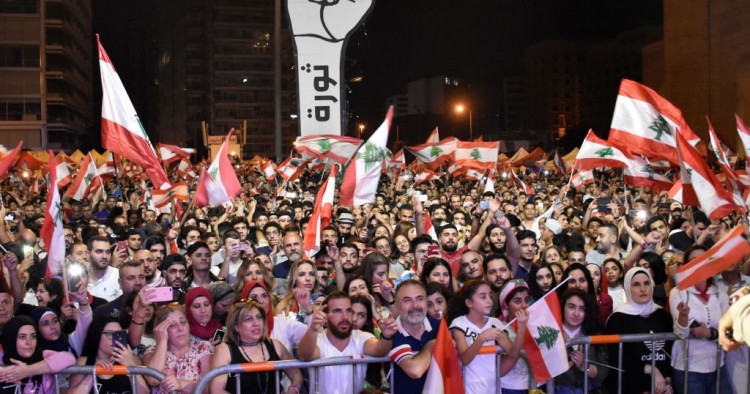Lebanon’s popular uprising seems to be moving into a long and painful standoff between, on the one hand, a new generation along with a wide spectrum of the population demanding wholesale accountability and profound change, and on the other a ruling class mired in an interdependent web of corruption, intent on protecting its interests and waiting out the populace.
Indeed, the Oct. 17 uprising is taking on the outlines of a more profound and drawn-out revolution; between a population intent on overthrowing a corrupt, sectarian, oligarchy that has led Lebanon to ruin, and a ruling class that is increasingly aware that it is dealing with a new public consciousness and that it is fighting for its life.
A young female protestor said it best when she said, “I don’t care about Christian rights, or Muslim rights; I care about our right to water, to electricity, to jobs, to a future.”
There is still virtually no progress on the protestors’ minimum demand of forming a new government of independent technocrats. Both Hezbollah Secretary-General Hassan Nasrallah and President Michel Aoun are stubborn leaders used to digging in their heels for the long haul. Aoun maneuvered for almost 30 years to become president; he is not going to be swayed in a few months. And Nasrallah claims to see a U.S. conspiracy behind every tree (or whatever is left of them!), and rejects a full change of government as an act of supposed “resistance” against a foreign conspiracy.
The governor of the Central Bank, Riad Salameh, came out on Monday to reassure bankers and depositors that there would be no capital controls, “haircuts” for big depositors, or a currency devaluation. While that might be good news on one level, it gives the oligarchy the reassurance to defy and wait out the populace.
The focus of protests moved last week from blocking the streets and putting general pressure on the government, to a new strategy of naming and shaming particular politicians, and demanding that they be prosecuted to give back what they stole. In a combination of panic and arrogance, the ruling class had the audacity to schedule a parliamentary meeting on Tuesday with the intent of passing a new amnesty law that would absolve them, retroactively, of a slew of financial, administrative, security, and environmental crimes. After protestors threatened to block all roads to parliament, Speaker Nabih Berri cancelled the planned session.
The barricades seem to be hardening in a long confrontation between a corrupt government and its people.
Paul Salem is the president of MEI.
Photo by Mahmut Geldi/Anadolu Agency via Getty Images
The Middle East Institute (MEI) is an independent, non-partisan, non-for-profit, educational organization. It does not engage in advocacy and its scholars’ opinions are their own. MEI welcomes financial donations, but retains sole editorial control over its work and its publications reflect only the authors’ views. For a listing of MEI donors, please click here.













